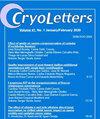印度尼西亚和新西兰附生和陆生兰花种子冷冻保存的比较。
IF 0.9
4区 生物学
Q3 BIOLOGY
引用次数: 0
摘要
背景:在一些兰花物种中报道的非典型种子储存行为证明了低温保存是传统种子库的补充保护策略。目的评价5种兰科植物种子的低温保存潜力;2种热带附生,印度尼西亚种(石斛),1种温带附生,新西兰种(D. cunninghamii)和2种温带陆生,新西兰种(Pterostylis banksii, Thelymitra nervosa)。材料与方法采用液氮直接浸泡法和冷冻保护剂玻璃化法对种子进行冷冻保存。对于后者,种子在室温或冰上分别暴露于植物玻璃化溶液2 (PVS2)中0、20、50和70分钟,然后浸泡在LN中。结果所有植物种子在低温直接冷却后萌发良好。热带附生植物和非热带附生植物的种子在低温保存和非低温保存下的幼苗发育能力没有差异,直接浸泡在LN中可以促进两种温带陆地植物的种子萌发和新梢形成。结论通过对萌发和萌发后生长的一系列分析,我们的研究显示了热带和温带地区附生或陆生兰花的低温保存潜力。Doi: 10.54680 / fr23410110312。本文章由计算机程序翻译,如有差异,请以英文原文为准。
Comparative seed cryopreservation of indonesian and new zealand epiphytic and terrestrial orchids.
BACKGROUND
The atypical seed storage behaviour reported in several orchid species justifies cryopreservation as a complementary conservation strategy to conventional seed banking.
OBJECTIVE
This study aimed to assess the seed cryopreservation potential of five orchid species; two tropical epiphytic, Indonesian species (Dendrobium strebloceras, D. lineale), one temperate epiphytic, New Zealand species (D. cunninghamii) and two temperate terrestrial, New Zealand species (Pterostylis banksii, Thelymitra nervosa).
MATERIALS AND METHODS
Seeds were cryopreserved by direct immersion in liquid nitrogen (LN) and through the application of a cryoprotectant vitrification method. For the latter, seeds were exposed to Plant Vitrification Solution 2 (PVS2) for 0, 20, 50, and 70 min, at either room temperature or on ice, prior to immersion in LN.
RESULTS
Seeds of all the studied species germinated well following direct cooling in LN. There was no difference in the seedling development capability between cryopreserved and non-cryopreserved seeds of both tropical epiphytic species and direct immersion in LN enhanced seed germination and shoot formation in both temperate terrestrials.
CONCLUSION
Through a range of analyses of germination and post-germination growth, our study shows the potential for cryopreserving epiphytic or terrestrial orchids from tropical and temperate regions. Doi: 10.54680/fr23410110312.
求助全文
通过发布文献求助,成功后即可免费获取论文全文。
去求助
来源期刊

Cryo letters
生物-生理学
CiteScore
1.80
自引率
10.00%
发文量
50
审稿时长
1 months
期刊介绍:
A bimonthly international journal for low temperature sciences, including cryobiology, cryopreservation or vitrification of cells and tissues, chemical and physical aspects of freezing and drying, and studies involving ecology of cold environments, and cold adaptation
The journal publishes original research reports, authoritative reviews, technical developments and commissioned book reviews of studies of the effects produced by low temperatures on a wide variety of scientific and technical processes, or those involving low temperature techniques in the investigation of physical, chemical, biological and ecological problems.
 求助内容:
求助内容: 应助结果提醒方式:
应助结果提醒方式:


